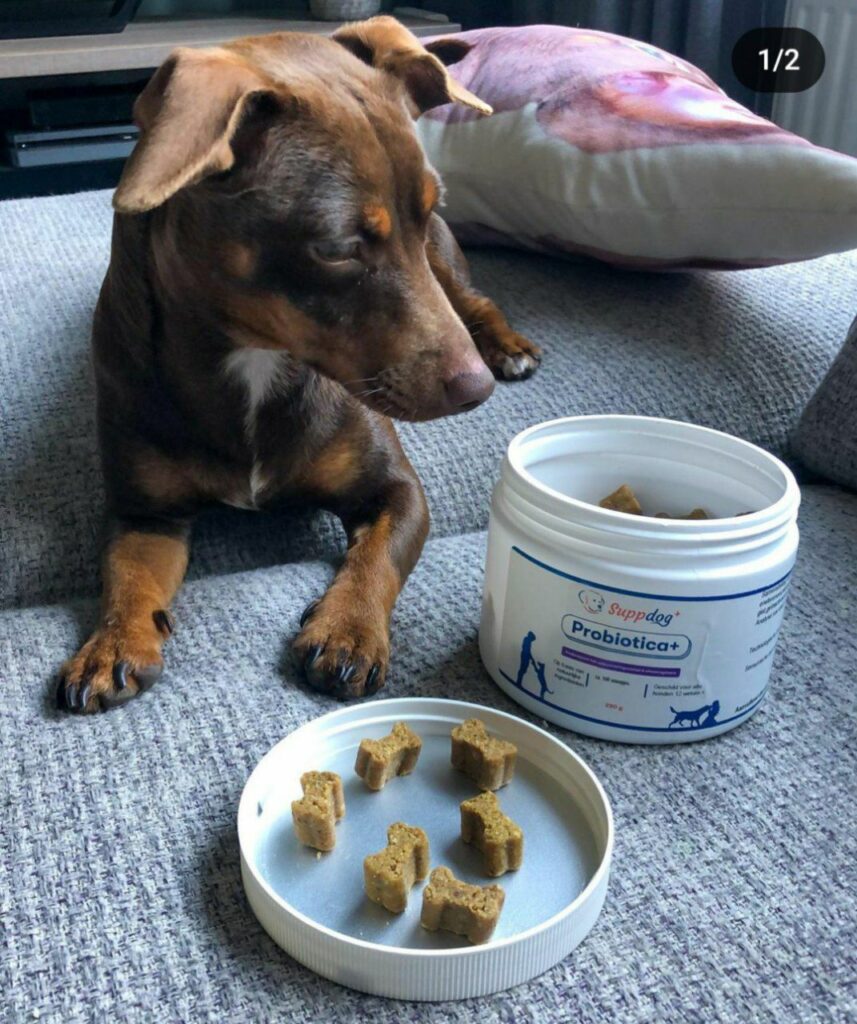What Are Probiotics for Dogs?
Definition of Probiotics
Probiotics are live microorganisms that, when administered in adequate amounts, confer a health benefit to the host. In dogs, these beneficial bacteria help maintain a healthy balance of microorganisms in the digestive tract.
How probiotics support gut health:
- Crowd out harmful bacteria: Probiotics compete with harmful bacteria for space and nutrients, reducing their numbers.
- Aid digestion: They produce enzymes that help break down food, improving digestion and nutrient absorption.
- Strengthen the gut barrier: Probiotics can help strengthen the lining of the gut, preventing harmful substances from entering the bloodstream.
- Boost immune function: The gut is a major part of the immune system, and probiotics can help stimulate and support immune responses.
- Reduce inflammation: Probiotics may help reduce inflammation in the gut, which can be associated with various digestive problems.
How Probiotics Work in Dogs’ Digestive Systems
Imagine your dog’s gut as a garden.
- Harmful bacteria are like weeds that can overgrow and cause problems.
- Probiotics are like beneficial plants that help keep the garden healthy.
When you add probiotics to your dog’s food, they:
- Crowd out the weeds: Probiotics take up space and resources, making it harder for harmful bacteria to grow.
- Produce nutrients: They create substances that help break down food and absorb nutrients.
- Strengthen the fence: Probiotics help maintain a strong gut lining, preventing harmful substances from entering the body.
- Attract helpful insects: They support a healthy balance of microorganisms, which is essential for a healthy gut.
By doing these things, probiotics help your dog’s gut stay balanced and functioning properly.
Benefits of Probiotics for Dogs
Improved Digestion
Probiotics can help dogs with digestive issues like diarrhea, bloating, and gas in several ways:
- Restoring balance: Probiotics help restore the natural balance of bacteria in the gut. When this balance is disrupted, it can lead to digestive problems.
- Improving digestion: Probiotics produce enzymes that aid in digestion, breaking down food more efficiently and reducing the risk of digestive upset.
- Reducing inflammation: Probiotics can help reduce inflammation in the gut, which is often associated with digestive problems like diarrhea and bloating.
- Strengthening the gut barrier: A healthy gut barrier helps prevent harmful substances from entering the bloodstream, reducing the risk of inflammation and digestive issues.
- Competing with harmful bacteria: Probiotics can compete with harmful bacteria for space and nutrients, limiting their growth and reducing the likelihood of infections.
By addressing these underlying causes, probiotics can help improve digestion, reduce symptoms, and promote overall gut health in dogs with diarrhea, bloating, and gas.
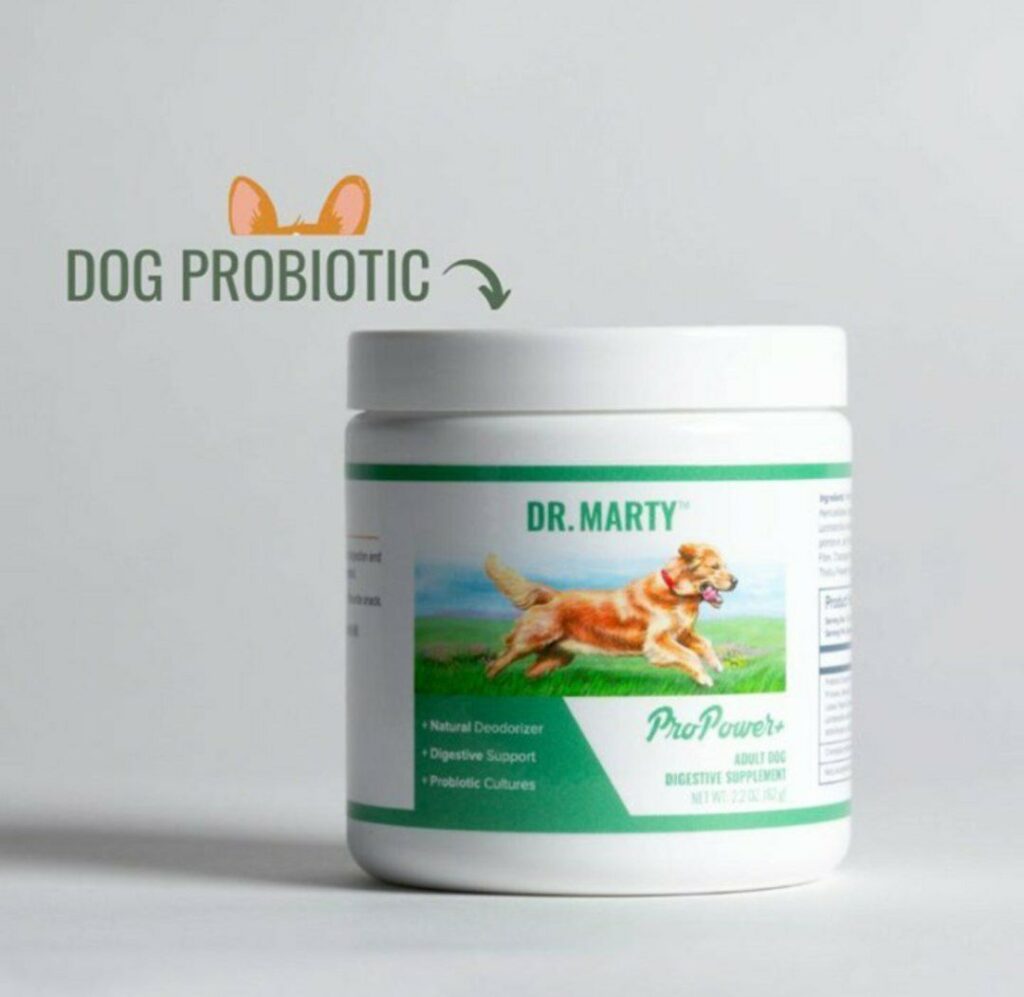
Boosting Immune Health
Probiotics and Immune Boosting
Probiotics play a crucial role in supporting a dog’s immune system, helping them fight off infections. Here’s how:
- Gut-Brain Axis: The gut is often referred to as the “second brain” due to its extensive network of neurons. This connection, known as the gut-brain axis, plays a significant role in immune function. Probiotics help maintain a healthy gut environment, which can positively influence the immune response.
- Stimulating Immune Cells: Probiotics interact with immune cells in the gut, stimulating their activity and enhancing their ability to recognize and fight off pathogens.
- Reducing Inflammation: Chronic inflammation can weaken the immune system. Probiotics can help reduce inflammation, allowing the immune system to function more effectively.
- Improving Gut Barrier Function: A healthy gut barrier helps prevent harmful substances from entering the bloodstream, reducing the burden on the immune system. Probiotics can strengthen the gut barrier, protecting the body from infections.
- Producing Antimicrobial Substances: Some probiotics produce antimicrobial substances that can directly kill harmful bacteria and fungi, providing an additional layer of defense.
By supporting these immune functions, probiotics can help dogs better resist infections and maintain overall health.
Skin and Coat Health
Probiotics and Skin Health
While primarily known for their benefits to gut health, probiotics can also have secondary effects on a dog’s skin and coat. Here’s how:
- Reduced Allergies: Gut health can influence skin allergies. Probiotics may help regulate the immune response, reducing the likelihood of allergic reactions that can lead to itchy skin, hair loss, and skin irritations.
- Improved Nutrient Absorption: A healthy gut ensures better absorption of nutrients, including those essential for skin and coat health, such as omega-3 fatty acids and vitamins.
- Reduced Inflammation: Inflammation can contribute to skin problems like hot spots and dermatitis. Probiotics can help reduce inflammation throughout the body, including the skin.
- Balanced Microbiome: The skin also has its own microbiome, which can be disrupted by factors like environmental irritants. Probiotics may help maintain a balanced skin microbiome, reducing the risk of skin infections and conditions.
- Reduced Yeast Infections: Yeast infections can cause skin problems in dogs. Probiotics can help regulate the balance of microorganisms in the body, making it less hospitable for yeast to thrive.
By addressing these underlying factors, probiotics can indirectly contribute to improved skin and coat health in dogs.
How to Choose the Best Probiotic for Your Dog
Factors to Consider
When selecting a probiotic for your dog, consider the following factors:
Age
- Puppies: Puppies have developing digestive systems, so a probiotic specifically formulated for young dogs can be beneficial.
- Senior Dogs: Senior dogs may have digestive issues related to aging. A probiotic designed for seniors can address these concerns.
Health Condition
- Digestive Issues: If your dog has specific digestive problems like diarrhea, constipation, or inflammatory bowel disease, look for a probiotic that targets those conditions.
- Allergies: If your dog has allergies, a probiotic that helps support a healthy immune system can be beneficial.
- Skin Conditions: If your dog has skin issues, a probiotic that addresses gut health and immune function may indirectly help improve skin health.
Allergies
- Dairy: If your dog is lactose intolerant, ensure the probiotic is dairy-free.
- Other Allergens: If your dog has other allergies, check the label for potential allergens.
Probiotic Strains
- Specific Strains: Some probiotic strains are more effective for certain conditions. Research specific strains to find the best fit for your dog’s needs.
Dosage
- Follow Instructions: Always follow the recommended dosage on the product label. Overdosing can be harmful.
Quality and Reputability
- Research: Choose a reputable brand that uses high-quality ingredients and has undergone testing.
Consult with a Veterinarian Before introducing a new probiotic to your dog’s diet, consult with your veterinarian. They can provide personalized advice based on your dog’s specific needs and health history.
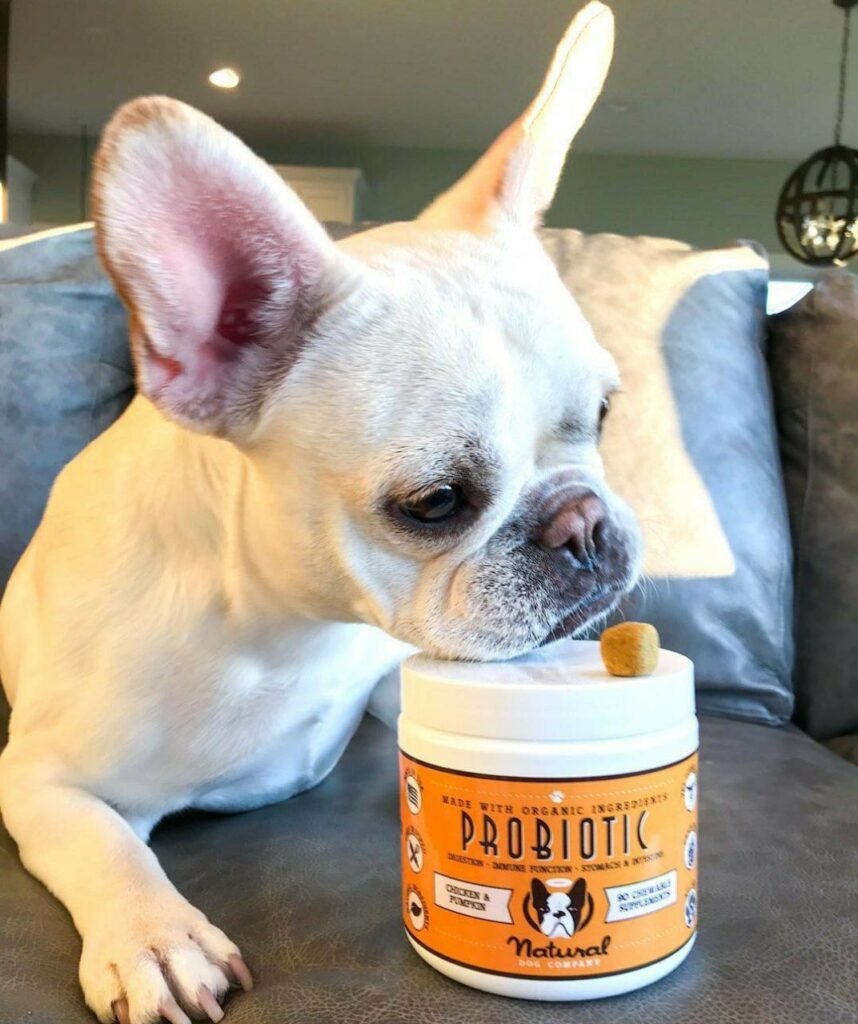
Types of Probiotic Supplements for Dogs
Probiotic Forms: Powders, Chews, and Capsules
Probiotics for dogs come in various forms, each with its own advantages and disadvantages.
Powders
- Pros:
- Easily mixed into food or water, making it convenient for picky eaters.
- Often more affordable than other forms.
- Cons:
- May have a bitter taste, causing some dogs to refuse it.
- Can be messy to handle.
Chews
- Pros:
- Often flavored to make them more palatable for dogs.
- Convenient and easy to administer.
- Cons:
- May contain additional ingredients that could be harmful to some dogs.
- Can be more expensive than powders.
Capsules
- Pros:
- Precise dosing, ensuring your dog receives the correct amount of probiotics.
- Can be easily administered by hand or mixed into food.
- Cons:
- May be difficult to administer to small dogs or those with swallowing difficulties.
- Can be more expensive than powders or chews.
Choosing the Best Form
The best form of probiotic for your dog depends on several factors:
- Your dog’s preferences: If your dog is picky, chews or capsules may be more appealing.
- Ease of administration: If you have a busy lifestyle, chews or capsules may be more convenient.
- Dosage requirements: If precise dosing is important, capsules may be the best option.
- Cost: Powders are generally the most affordable option.
Consult with your veterinarian to determine the best form of probiotic for your dog’s specific needs and preferences.
Top-Rated Probiotic Brands for Dogs
Purina FortiFlora
Purina FortiFlora: A Popular Probiotic Choice
Purina FortiFlora is a well-known and popular probiotic supplement for dogs. Its popularity can be attributed to several factors:
Reasons for Popularity
- Reputable Brand: Purina is a trusted name in pet food and supplements.
- Proven Effectiveness: Many pet owners have reported positive results, such as improved digestive health and reduced diarrhea.
- Convenience: It’s easy to administer, simply sprinkling the powder on your dog’s food.
- Quality Ingredients: Purina is known for using high-quality ingredients in its products.
Ingredients
Purina FortiFlora contains a proprietary blend of probiotics, including:
- Enterococcus faecium: A strain of bacteria that can help maintain a healthy balance of microorganisms in the gut.
- Lactobacillus acidophilus: Another beneficial bacterium that can support digestive health and immune function.
- Bifidobacterium animalis: A probiotic strain that can help improve digestion and nutrient absorption.
Customer Feedback
While individual experiences may vary, many customers have reported positive results from using Purina FortiFlora. Common benefits include:
- Improved Digestive Health: Reduced diarrhea, constipation, and other digestive issues.
- Enhanced Immune Function: Fewer illnesses and a stronger immune system.
- Better Coat and Skin: Improved skin health and a shinier coat.
- Increased Energy: Some pet owners have noticed increased energy levels in their dogs.
Overall, Purina FortiFlora is a popular and well-regarded probiotic option for dogs. Its combination of a reputable brand, quality ingredients, and positive customer feedback makes it a strong choice. However, it’s always recommended to consult with your veterinarian to determine if it’s the right probiotic for your specific dog’s needs.
Nusentia Probiotic Miracle
Nusentia Probiotic Miracle is a popular probiotic supplement for dogs. While it has gained a following, it’s essential to weigh the pros and cons before making a decision.
Pros of Nusentia Probiotic Miracle
- High-Quality Strains: The product often contains a variety of beneficial probiotic strains, such as Bifidobacterium and Lactobacillus, which can support digestive health and immune function.
- Natural Ingredients: Many Nusentia Probiotic Miracle products are formulated with natural ingredients and are free from artificial additives.
- Customer Reviews: Many customers report positive experiences with the product, citing improvements in digestive health, coat condition, and overall well-being.
- Convenience: The product is often available in easy-to-administer forms, such as powders or chews.
Cons of Nusentia Probiotic Miracle
- Price: Nusentia Probiotic Miracle can be more expensive than some other probiotic options.
- Limited Research: While many customers report positive results, there may be limited scientific research specifically supporting the effectiveness of this particular brand.
- Individual Variations: As with any supplement, results may vary depending on the individual dog and their specific needs.
Overall, Nusentia Probiotic Miracle can be a good choice for dog owners seeking a high-quality probiotic supplement. However, it’s essential to weigh the pros and cons, consider your dog’s specific needs, and consult with your veterinarian before making a purchase.
Zesty Paws Probiotic Bites
Zesty Paws Probiotic Bites are a popular choice among pet owners due to their unique presentation and potential benefits. These chewable treats are formulated with a blend of probiotics to support digestive health and overall well-being in dogs.
Key features and benefits of Zesty Paws Probiotic Bites:
- Delicious Taste: The bites are designed to be highly palatable, making them easy to administer even to picky eaters.
- Convenient Format: The chewable form offers a convenient way to provide probiotics to your dog.
- Natural Ingredients: Zesty Paws uses natural ingredients, including probiotics, prebiotics, and digestive enzymes.
- Supports Digestive Health: The probiotics in these bites can help maintain a healthy balance of gut bacteria, promoting digestion and reducing digestive issues.
- Boosts Immunity: A healthy gut is essential for a strong immune system. Probiotics can help support immune function.
- Improved Skin and Coat: A balanced gut can also contribute to healthier skin and a shinier coat.
Overall, Zesty Paws Probiotic Bites offer a convenient and tasty way to provide your dog with the benefits of probiotics. If you’re looking for a natural and effective way to support your dog’s digestive health and overall well-being, this product may be worth considering.
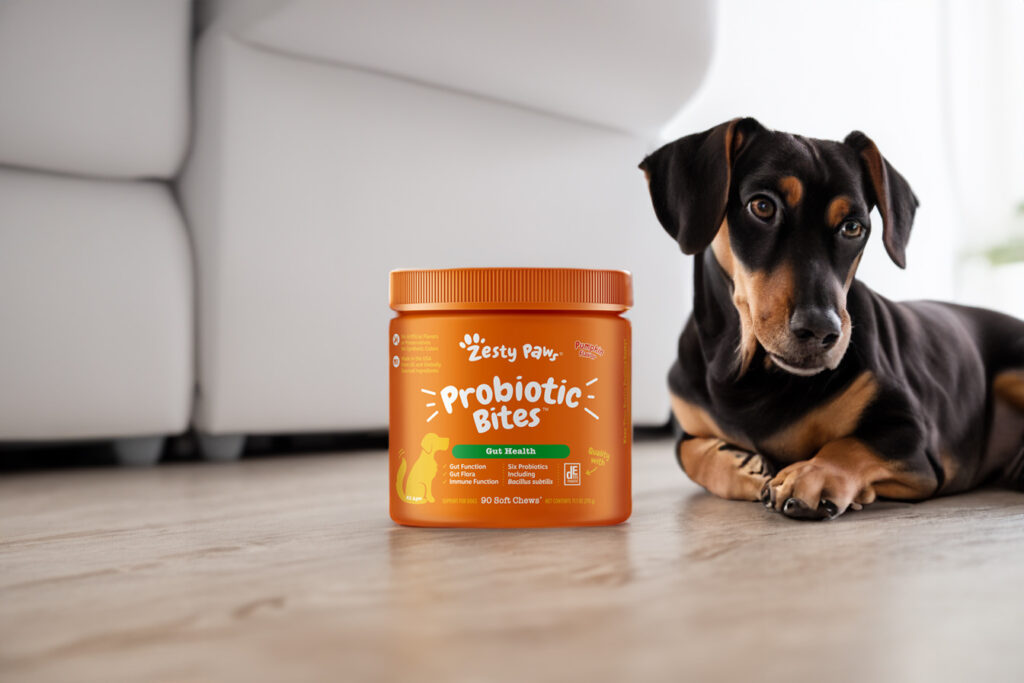
How to Introduce Probiotics into Your Dog’s Diet
Dosage Guidelines for Probiotics
While I can provide general dosage recommendations, it’s crucial to consult with your veterinarian for specific guidelines tailored to your dog’s individual needs, size, and health conditions.
Here are some general recommendations based on dog size:
| Dog Size | Approximate Dosage |
|---|---|
| Small (under 20 lbs) | 1/2 – 1 capsule or chewable |
| Medium (20-50 lbs) | 1-2 capsules or chewables |
| Large (50-100 lbs) | 2-3 capsules or chewables |
| Extra Large (over 100 lbs) | 3-4 capsules or chewables |
Factors to Consider:
- Dog’s Age: Puppies and senior dogs may require different dosages.
- Health Conditions: Dogs with specific digestive issues or weakened immune systems may need higher dosages or more frequent administration.
- Probiotic Product: The recommended dosage can vary depending on the specific probiotic product and its concentration of beneficial bacteria.
Always follow the instructions on the product label and consult with your veterinarian for personalized advice.
Signs of Improvement
When your dog starts taking probiotics, here are some positive changes you might notice:
Improved Stool
- Consistency: Stool should become firmer and less watery.
- Frequency: Diarrhea or constipation may improve.
- Reduced Odor: Stool may have a less unpleasant odor.
Increased Energy
- Playfulness: Your dog may seem more energetic and interested in playing.
- Reduced Fatigue: They might experience less lethargy and fatigue.
Other Positive Changes
- Improved Appetite: Your dog’s appetite may increase or become more consistent.
- Healthier Coat: Their coat may become shinier and softer.
- Reduced Skin Issues: Skin problems like itching or hot spots may improve.
- Better Immune Function: Your dog may experience fewer illnesses.
Remember, individual results may vary. If you don’t see significant improvements within a few weeks, consult with your veterinarian. They can assess your dog’s response to the probiotics and make any necessary adjustments.
FAQs About Probiotics for Dogs
Can All Dogs Take Probiotics?
Generally, most dogs can benefit from taking probiotics. However, there are a few considerations based on breed, age, and health:
Breed
- Sensitive Breeds: Some breeds, such as French Bulldogs or Pugs, may have more sensitive digestive systems. Probiotics can be beneficial for these breeds to help maintain a healthy gut balance.
Age
- Puppies: Puppies can benefit from probiotics to support their developing immune systems and digestive health.
- Senior Dogs: Older dogs may experience digestive issues due to aging. Probiotics can help improve their digestion and overall health.
Health
- Digestive Issues: Dogs with specific digestive problems like diarrhea, constipation, or inflammatory bowel disease often benefit from probiotics.
- Allergies: Probiotics may help regulate the immune system and reduce allergic reactions in some dogs.
- Immune System: Probiotics can support a healthy immune system, which is especially important for dogs with compromised immune function.
It’s essential to consult with your veterinarian before starting your dog on a probiotic supplement. They can assess your dog’s individual needs and recommend the most appropriate probiotic for their age, breed, and health condition.
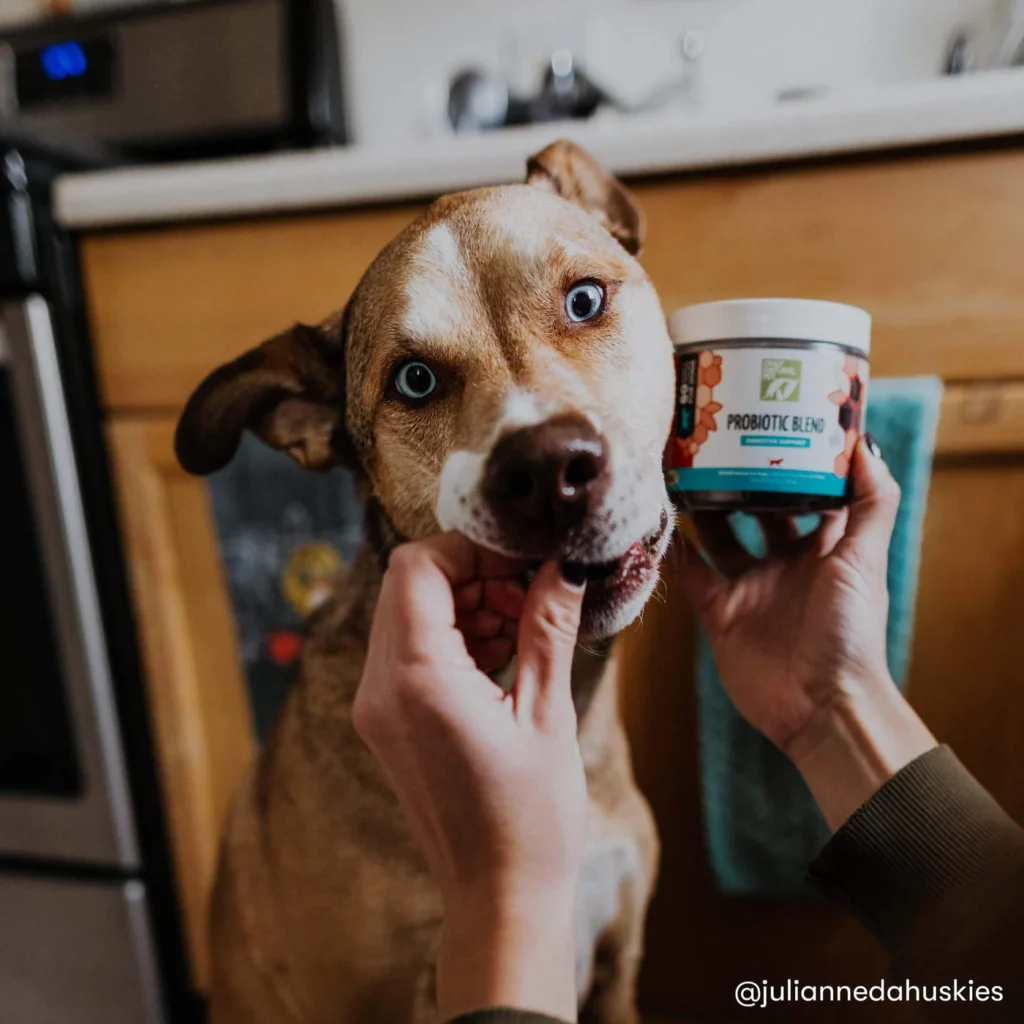
Are There Any Side Effects of Probiotics for Dogs?
While probiotics are generally safe for dogs, there are a few potential side effects:
- Digestive Upset: In some cases, introducing probiotics to your dog’s diet may initially cause digestive upset, such as gas or diarrhea. This is usually temporary and resolves as your dog’s gut adjusts.
- Allergic Reactions: Although rare, some dogs may have allergic reactions to specific ingredients in probiotic supplements. If you notice any signs of allergies, such as itching, hives, or difficulty breathing, discontinue use and consult your veterinarian immediately.
If your dog experiences any side effects, here are some steps you can take:
- Reduce the Dosage: Try reducing the amount of probiotics your dog is receiving.
- Temporarily Discontinue: If the side effects persist, consider temporarily stopping the probiotic.
- Consult Your Veterinarian: Your veterinarian can help determine the cause of the side effects and recommend alternative options.
Remember, it’s important to monitor your dog’s response to probiotics and consult with your veterinarian if you have any concerns.

